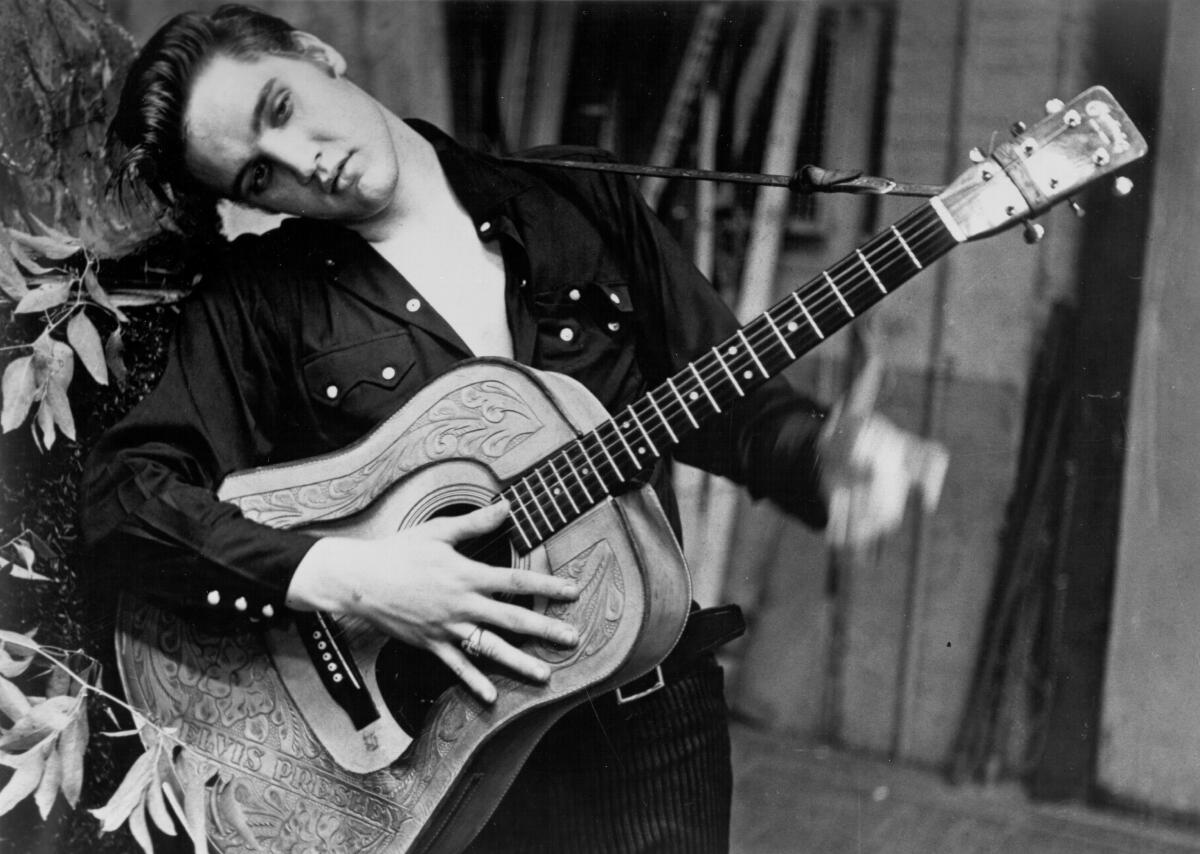A blue Christmas song can be a comfort, when everyone else seems to feel joy

- Share via
In American culture, Christmas is often synonymous with joy. Many familiar carols proclaim this message, with “Joy to the World” resounding in thousands of churches, while its secular counterpart exhorts listeners to have “A Holly Jolly Christmas.”
But for many people the emotions of the season are more complicated, and this time of year brings forth feelings of nostalgia and melancholy. We think of loved ones missing from the holidays. Parents are wistful for a time when their children still wrote to Santa. Nearly everyone has too much to do, and lonely people may feel their isolation more acutely.
When Christmas music starts its multiweek marathon, I often think about songs that recognize how this “most wonderful time of the year” can actually feel far from it.
Some of this sentiment was captured by Elvis Presley in his version of “Blue Christmas,” which tells a tale of romantic separation: “I’ll have a blue Christmas without you / I’ll be so blue just thinking about you.”
The notion of a blue Christmas is increasingly being recognized by churches, where one might expect messages of holiday joy to override more conflicted emotions. Some congregations now offer Blue Christmas services, where readings underscore the reality of loss but also the message of hope represented by the birth of Christ.
In fact, during Advent, the period of the church calendar leading up to Christmas, churches often emphasize the sense of mystery and confusion that preceded Christ’s birth. Possibly the best known Advent song is “O Come, O Come, Emmanuel,” which has a solemn, chantlike melody that dates back to 15th century France.
The opening verse refers to the Jewish inhabitants of ancient Jerusalem, conquered by Babylon and mourning in “lonely exile here.” Awaiting a messiah or “Immanuel,” meaning “God with us,” predicted by the prophet Isaiah, they yearn for him to “disperse the gloomy clouds of night / And death’s dark shadows put to flight.”
Beyond church doors, Vince Guaraldi’s “Christmas Time Is Here,” with its moody jazz harmonies and waltz feel behind an angelic-sounding children’s choir, captures the bittersweet quality of the holidays. It’s the opening song of the classic “Peanuts” animated TV special that begins, fittingly, with a depressed Charlie Brown going to Lucy for therapy.
But, to my mind, “I’ll Be Home for Christmas” might convey the atmosphere of nostalgia and melancholy of the season better than any other. Recorded in October 1943, almost exactly halfway through World War II, the song became a hit for Bing Crosby, just as his “White Christmas” had the year before.
“I’ll be home for Christmas,” he sings in his rich baritone, describing the snow and mistletoe he’s hoping for — before listeners realize this visit home may occur “only in my dreams.”
The popularity of Crosby’s version of this song is due, in part, to how it captured the feelings of a world at war. Yet, fearing it might lower morale, the BBC banned the song during the war, saying it had “adopted a policy of excluding sickly sentimentality which, particularly when sung by certain vocalists, can become nauseating and not at all in keeping with what we feel to be the need of the public in this country.”
The catalog of melancholy Christmas tunes is large and still growing. “Have Yourself a Merry Little Christmas,” with its mood of wishful thinking, was also written in the wartime of 1943, telling us that “through the years we all will be together / If the fates allow.” “Please Come Home for Christmas,” a hit for many artists including the Eagles, doubles down on the romantic longing of “Blue Christmas.” Joni Mitchell’s “River” opens with a wistful piano playing notes from “Jingle Bells” and includes the lyrics “I wish I had a river I could skate away on.” The list goes on.
It’s no mystery why this season has produced its share of sad songs. For so many of us, the holidays carry an emotional barb. Some people have too many people to connect with and buy gifts for — others not enough.
December can be a lonely month. We often measure our current lives against the past, with much of the angst filtered away by selective memory. Still, even for those who find this season difficult, the holidays can hold the promise of a more peaceful, harmonious world. And we can take some comfort in the fact that the mixed emotions of the holidays have helped create some wonderful music that reminds us that, in some way, we can together “muddle through, somehow” — at least while the songs are playing.
David W. Stowe teaches religious studies at Michigan State University and is the author, most recently, of “Song of Exile: The Enduring Mystery of Psalm 137.” This article was produced in partnership with The Conversation.
More to Read
A cure for the common opinion
Get thought-provoking perspectives with our weekly newsletter.
You may occasionally receive promotional content from the Los Angeles Times.









